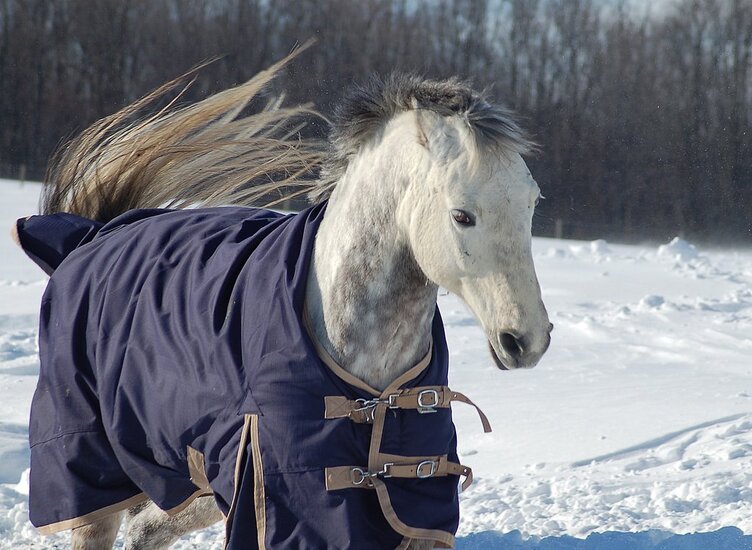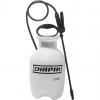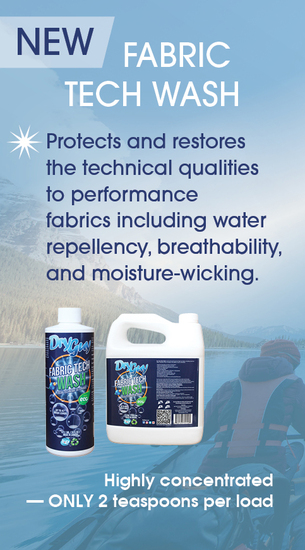I recently posted a question on my Facebook page asking whether people used blankets for their horses during cold weather, or not, and why. The responses I got indicated a very complex topic and well worth taking a more in-depth look at for a winter horse care topic. Most of the responders who preferred to blanket were located in areas where winters tended toward, but were not limited to, temperatures well below freezing and prone to heavy winter precipitation. Those in more moderate climates tended to let nature take it's course unless a horse was predisposed to problems such as a compromised immune system, insufficient winter coat growth or geriatric. And then there were some that simply opted for a blanket "just in case". For those that are on the fence about whether or not they should blanket their horses, perhaps this list of pros and cons will help you make an informed decision that best meets the needs of your individual situation.
The Horse's Natural Heater
Winter horse care holds many challenges, not the least of which is to blanket... or not to blanket. We want our horses to be safe and healthy and we sure don't want them to be uncomfortable. But is it really necessary to add to what Mother Nature has already provided them with? Studies have shown horses can actually withstand extremely cold temperatures utilizing what nature has provided them with - their winter coat - provided that they are in good health with access to adequate food. Believe it or not, horses can handle temperatures as low as 5º F before experiencing a drop in body temperature. Other factors such as wet weather and wind chill can affect this number though. When the weather gets cold, a horse's winter coat will "fluff up" giving them that characteristic "puff ball" look. This creates an insulated area of warm air next to the horse's body that helps to keep them warm. It is quite effective, and even horses that have been blanketed for most of their lives can adapt to extreme cold over time given the chance. They can adapt to the change in climate in less than a month in most cases.
The process of digestion in the horse actually generates heat and helps keep the horse warm during cold weather. During cold weather it is recommended that extra clean, dry hay be provided in order to support the horse's natural heating system. For horses in good health this may be all the extra steps required in order o help them make it through a brief cold spell.
During colder weather horses become more active. The characteristic silliness that we horse owners see from our horses when the temperature drops is actually helping them to stay warm. This is a great activity for them to self-regulate their body temperatures. When the temperatures rise and/or fall throughout the day, they can adjust their activity levels accordingly.
Helping Your Horse Through Winter Weather
There are several things we can do as horse owners that are simple and effective ways to help our horses make it through the colder temperatures of winter.
- Offer your horse a good windbreak or shelter to block from cold wind. Wind can suck away the warm air trapped between the body and hair coat making it harder for your horse to stay warm. Rain lays down the hair and reduces it's ability to insulate the horse from the cold. A fancy barn is nice but not always necessary to help make your horses more comfortable in inclement weather. A simple three-sided shed that blocks the north wind and allows them a dry place to shelter from the rain or snow can make a huge difference. Quite often I'll even find my own horses outside our shed with their butts to a row of thick cedars. They have the choice of how much or little shelter they utilize.
- Providing access to plenty of clean, dry hay. As noted above, the act of digesting food produces heat and provides a good source of heat for your horse.
- Providing extra layers of clothing for your horse in the form of blankets is a great way to help them stay warm, especially if your horse does not have access to a suitable shelter. During very cold and/or wet weather, the added protection of a blanket can provide extra protection.
Blanketing Pros And Cons
Sometimes horses just need a little helping hand and there's just not any way around it. Horse's with problems holding weight, inadequate winter coat development or compromised digestive systems may need the extra insulation provided by a blanket.
Horses that are in training and/or worked regularly will tend to sweat heavily during workouts and take extra long to dry afterward. In cases such as this, it is often a better choice to keep them clipped of their winter coat. Since they have been deprived of their natural ability to keep warm. I is recommended to blanket these horses. Always keep in mind that by blanketing, your horse will be unable to help regulate its own temperature and you may need to provide layering that can be added or removed as necessary. If your horse is stalled and/or limited in its ability to move in order to increase it's body temperature, they may need a little extra help when the temperature drops even into what many would consider "mild" temperatures.
If you decide that a blanket is the way to go for your horse, making sure the blanket you choose is up to the task at hand is just as important as the decision to blanket. Inadequate blanketing can be more detrimental to your horse than no blanket at all in inclement weather. Since blankets will cause a horses hair to lay down flat due to compression from the weight of the blanket, it is extremely important that the blanket be adequately insulated during very cold weather and waterproof if precipitation is a factor. If your blanket is not up to the task in either of these situations, it can actually cause the horse to become more chilled than leaving them to their own natural protective insulation of hair.
Ill fitting blankets can cause many problems for your horse. Horses can develop painful sores from blankets that are both too tight and too loose, and the risk for secondary infections to these sores increases. Low hanging straps and torn blankets can also increase risk of entanglement for your horse, particularly if they are turned out. Horses are notorious for chewing on and ripping their blankets and those of their herd mates, so precautions should be taken in herd situations. Check blankets thoroughly each day to check for tears and broken straps.
If the temperatures are fairly mild during the day and only get very cold at night, leaving a heavy blanket on your horse round the clock can cause them to sweat underneath the blanket and then they are likely to become chilled during the overnight hours. This can compromise their natural immune system and leave them susceptible to illness. In conditions like these where you cannot get to your horse to adjust layers of blankets or remove them as the temperature rises, it is sometimes better to simply leave the blanket off and offer a good windbreak/shelter and extra hay than to leave them blanketed all day.



















Comments